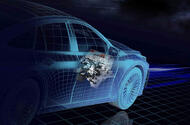New system, which will also be cheaper and more durable, is being readied for production from 2027
Toyota is working on a third-generation hydrogen fuel cell system that's claimed to bring double the power and 20% greater efficiency without any increase in size.
For reference, the stack used in the current Toyota Mirai FCEVÂ puts out 128kW.
Toyota said the new system will be ready for launch in 2027Â at the earliest.Â
It's primarily aimed at Japan’s heavy-duty commercial vehicle class, comprising machines such as diggers, but will also feature in passenger vehicles, suggesting that Toyota is readying a thirzd-generation Mirai for around the same time.
The company has sold around 28,000 examples of the hydrogen-fuelled saloon since the original model's introduction 11 years ago.Â
Toyota added that the new fuel cell system will be twice as durable as the current one, aiming for it to be on a par with its diesel combustion engines.
The fuel cell is also said to cost significantly less to produce, although Toyota has yet to detail exactly how that compares with that used in the existing Mirai.
Toyota has been the car industry’s most vocal proponent of hydrogen power in recent years, emphasising its lower weight compared with battery electrification – crucial for commercial vehicles – and the potential to offer longer range for operation in remote areas.
However, it told Autocar in 2023 that the Mirai had “not been successfulâ€, citing the limitations imposed by the rarity of hydrogen filling stations. It said it was adjusting its hydrogen focus to commercial vehicles but ultimately remained committed to the fuel.
Thiebault Paquet, Toyota’s hydrogen boss in Europe, told Autocar last year that he believes the company “can rebuild the story†of the fuel by focusing on heavy-duty models. “Hydrogen will come; this is something we’re convinced about,†he said.
Toyota isn't alone in backing the alternative fuel, though. Hyundai, for instance, is working on a second iteration of its Nexo FCEV.
Speaking at Hyundai's investor day last year, president and CEO Jaehoon Chang described it as a “chicken-and-egg issueâ€, comparing the industry’s mood to that around early battery electric cars.
“The market requires investment,†Chang said. “Thirty years ago, when BEVs were launched, the same issues were mentioned: cost, where to charge and [whether it makes sense].â€
Similarly, BMW plans to launch a range of hydrogen FCEVs, starting with a next-generation X5. These will use Toyota fuel cells rather than the company’s own designs, however.

